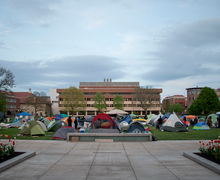Rev Run of Run-D.M.C. preaches importance of hip-hop at panel
A wave of surprise spread through the audience as Joseph Simmons walked down the aisle past the audience in Gifford Auditorium and headed up to the stage.
Joseph ‘Rev. Run’ Simmons, former member of hip-hop group Run DMC, joined a panel at Wednesday night’s discussion of ‘Race, Religion and Hip-Hop in the Modern World.’ The rapper is known for hits like ‘It’s Tricky’ and starring in MTV’s reality TV show ‘Run’s House.’
Hosted by the Syracuse University chapter of Phi Beta Sigma, the panel discussed the influence and presence of hip-hop and religion today. The speakers included DJ Maestro; Hassan Stevens, a hip-hop professor and mentor at the local Hillbrook Detention Center; and Don Sawyer III, a hip-hop professor at SU. Sitting next to them, Simmons shared his opinions on hip-hop as a business and an entity.
Ousman Diallo, a senior information technology major, opened the event. He shared a poem titled ‘How I Met Hip-Hop,’ which cleverly addressed many stigmas and stereotypes attached to present day hip-hop.
Simmons, who grew up in a time when hip-hop was still a newly established genre, stated that hip-hop was born from the streets in the ghettos. He declared that hip-hop was formulated out of honest emotions and real-life situations coming out of the ghetto, which were often not positive ones.
‘Positive music needs flavor,’ Simmons said.
The rapper also proclaimed his admiration for mainstream hip-hop. Simmons said that if he were stuck on a desert island and only able to listen to one artist, he would bring Kanye West’s music. He jokingly commented on West’s broad spectrum of emotions in his music, but acknowledged his genuine artistry. The crowd clapped in agreement with his choice.
Diallo and Jason Adams, a junior communication and rhetorical studies major and rapper, both commented on the conflicting dynamics of the panel. Both Sawyer and Stevens held their own in discussions with Simmons, interjecting and offering their ideas to create a wider scope of understanding of the genre. Adams made his point clear that it was the audience’s call about whose opinion to side with.
‘It’s up to everyone in the audience to digest the information,’ Adams said.
The audience silently dissected what was said. Not only did all three panelists share their viewpoints with each other and the public, but they opened doors for the conversation to continue even after the arguments onstage ended.
Said Simmons at the end of the panel: ‘Go where you are celebrated, not tolerated. Go where you are adored, not ignored.’
Published on March 21, 2012 at 12:00 pm




